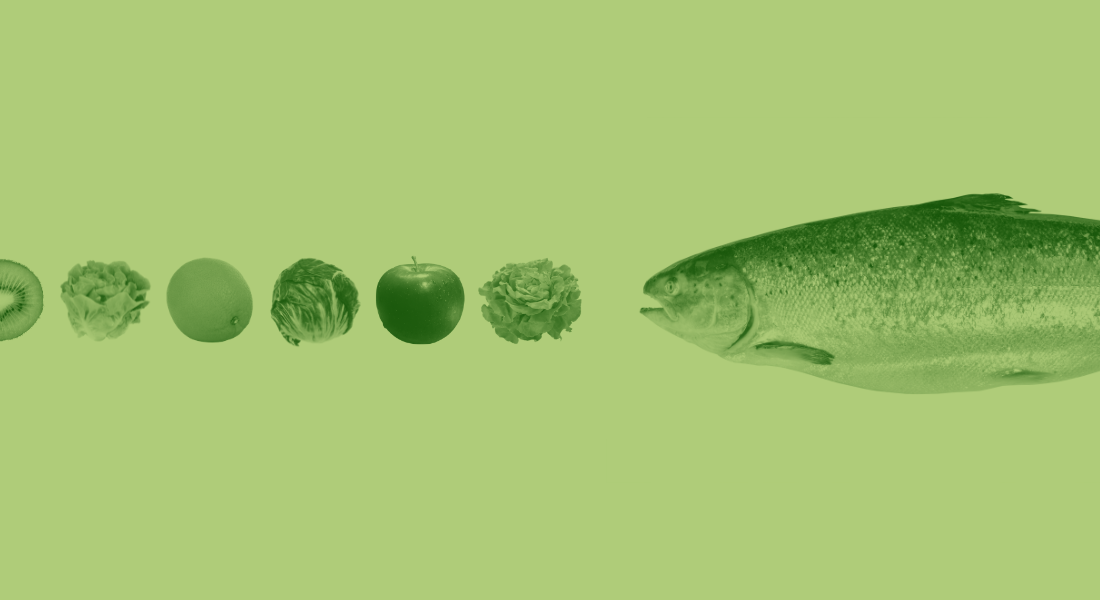Plant-based salmon feed aims to make salmon production more sustainable. This can result in better fish for dinner, and knowledge about gut bacteria can also impact more sustainable feed for other farm animals.

Salmon are natural carnivores. In the wild, they eat insects, insect larvae, small herring, crustaceans, and animal plankton. However, in farming, salmon are also fed seafood-based feed, making production dependent on resource-intensive fishmeal and fish oil.
Researchers from the University of Copenhagen and the Norwegian University of Life Sciences are working to replace seafood-based feed with plant-based feed. This could have positive effects on both the health of farmed salmon and the salmon that end up on our plates.
"Eventually this will help to enhance the nutritional quality of farmed salmon, ensuring that consumers receive fish that is not only healthier but also richer in beneficial nutrients," says Morten Tønsberg Limborg, associate professor at the Globe Institute at the University of Copenhagen and one of the researchers behind the new study.
An insight into the salmon's gut
Before introducing the new type of feed to salmon, researchers need to understand their microbiome to ensure the salmon can best utilize and digest the new nutrients. Salmon naturally lack many of the enzymes needed to break down plant-based feed.
Therefore, the researchers have mapped the genetic material from 211 different microorganisms found in the gut of Atlantic salmon.
The many new bacterial genomes in the analyses of the salmon's microbiome were collected through traditional cultivation methods in the laboratory and advanced DNA sequencing methods using samples from both wild and farmed fish in fresh and salt water.
The study, published in the journal Nature Microbiology, was conducted in collaboration with an international research team from the Norwegian University of Life Sciences (NMBU), the University of Galway, the Swedish University of Agricultural Sciences, and the University of Copenhagen.
"The analyses of the genes of the microorganisms allow the researchers to "see" into the salmon's gut and reveal which good bacteria help the fish to break down and utilize the nutrients in the feed," says Morten Tønsberg Limborg.
"Thanks to the study, we now understand how the microbes in the salmon's gut function, for example, by enhancing nutrient absorption and the immune system. This allows us to develop feed that adapts the chemical structure of the ingredients in the salmon's plant diet to the stomach and digestion capabilities of the salmon," says Morten Tønsberg Limborg.
He adds that, besides the health and sustainability perspectives of the study, there is also new and important knowledge about antibiotic resistance in farmed salmon.
"Contrary to popular belief, very low amounts of antibiotics are used in Norwegian salmon farming. We are already investigating whether this has also led to less antibiotic resistance in its gut flora in a follow-up study."
Benefits for other parts of agriculture
There is an increasing demand for food as the world's population grows, making it necessary to rethink the ingredients in fish feed.
"Salmon aquaculture presents a huge opportunity to provide high-protein, nutrient-rich food. With wild fish stocks struggling to meet the increasing needs, sustainable aquaculture offers a solution to produce more seafood without overfishing," says Morten Tønsberg Limborg.
He hopes that the knowledge gained from research on the salmon's microbiome and its ability to digest plant-based food can lead to considering such feed for other animals in Danish agriculture, making it more sustainable.
"One of the most exciting discoveries in our study is that some of the beneficial bacteria in salmon can produce essential B vitamins. This is important because we can design future feed to increase the growth of these bacterial mini-factories that produce essential vitamins instead of adding expensive vitamins to the feed," says Morten Tønsberg Limborg, adding:
"This approach holds great potential to enhance sustainability for all other animals in our food production systems, such as using insect feed, which is ultra-sustainable."






